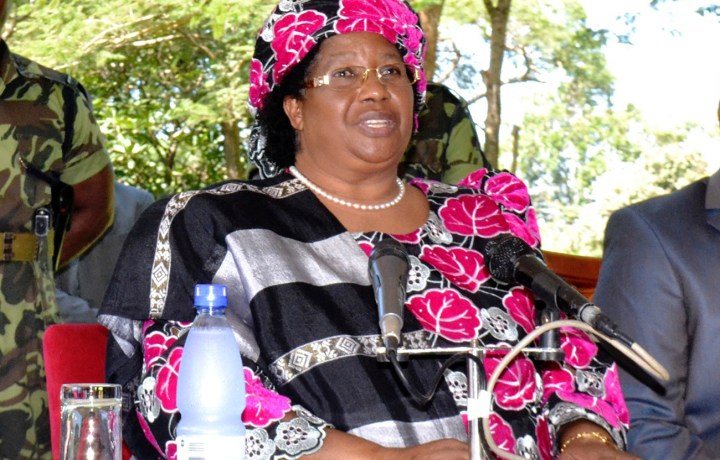It hasn’t taken long for new President Joyce Banda to put her stamp on Malawi. In just over a month, she’s upset the African consensus on arresting Sudan’s President Bashir, devalued the country’s currency by half and in general been as different as possible from her late predecessor. This can only be a good thing, writes SIMON ALLISON.
Presidents don’t run countries on their own. In most functioning states – even in most dysfunctional ones – the man or woman at the top is but the outward face of large, lumbering system of hierarchy and power relations that really governs how things are done. But the president sets the tone, and sometimes this is more important than anything else.
Nowhere is this clearer than in Malawi, where a new president has completely reinvigorated the country. In the space of a few short weeks, Malawi has been transformed from a stagnant near-autocracy to a promising, vibrant democracy. And the only aspect that’s been changed is the occupant of State House.
“The general mood of the country following the demise of former president Bingu wa Mutharika and the subsequent coming in of President Joyce Banda is that of disbelief, relief and optimism,” commented Malawi Capital Radio editor Madalitso Phiri, in an email interview with Daily Maverick. “Hearing from our listeners in our talk show programmes and on our social media pages, there is a sense that Mutharika died at a time when his popularity was at its lowest… so, there was almost a sigh of relief by most Malawians that they could be heading in the right direction.”
Banda assumed power after the sudden death of autocrat-in-waiting Mutharika. As vice-president, this was her right, although it took the army to protect the constitutional succession from Mutharika’s political allies who wanted the top job for themselves. And while the faces in parliament remain the same, and the civil service is largely intact, she has already made her mark with a couple of big decisions signalling that she does things differently. In fact, she’s doing “the complete opposite of her predecessor”, said Phiri, and Malawi’s population is welcoming the change.
Her first major break with the past was a bold diplomatic move, asking Sudan’s President Omar al-Bashir – he of International Criminal Court arrest warrant fame – not to attend July’s African Union summit in Malawi. Banda requested that Sudan send a representative to the summit instead, apparently concerned about what international donors would think of her welcoming an alleged war criminal.
This aligns Malawi with a small minority of African countries prepared to even acknowledge their legal obligations. South Africa leads this minority, but it’s an unpopular position on the continent, whose leaders for the most part see the ICC as a western tool used only to persecute Africans (this view is not without its merits, but one wonders if the resistance of some African leaders to the ICC is because they’re scared of ending up there themselves). Either way, Banda’s open defiance of the African consensus is a welcome sign that she is prepared to go her own way. Especially since her predecessor welcomed Bashir with open arms less than a year ago.
But Banda’s biggest decision by far has been to heed the increasingly frantic advice of the International Monetary Fund and other donors and unpeg Malawi’s currency, the kwacha, from the dollar. For years the kwacha’s value has been kept artificially high, but on Monday this was scrapped and the currency was “fully liberalised”. It immediately appreciated by nearly 50%. Suddenly, a dollar bought you 250 kwacha, up from 168. That’s on the official markets, at least; because of the foreign currency shortage – brought about in part by the artificial exchange rate – most businesses were forced to buy and sell on the black market at a rate similar to the new one. “Most commodity prices already reflect the black market rate,” said the International Monetary Fund. “It is expected this devaluation should not trigger additional price increases.”
Malawi’s citizens aren’t so confident. The BBC reports panic-buying at shops in Lilongwe and other major cities, with shelves quickly emptying of staples such as sugar, cooking oil and bread. Their scepticism is understandable – how would you react if you were suddenly informed that your currency was worth half as much as yesterday? – but probably misplaced. Most economists agree that the new exchange rates should help attract foreign investment, thus increasing the country’s foreign exchange reserves and making it easier to import those things that had become so scarce in Mutharika’s last months: medicine, for example, and petrol. The devaluation will also make Malawi’s exports much more attractive on international markets.
There is one large downside to the devaluation, in the short-term at least: international travel will become significantly more expensive, limiting Malawians’ mobility. The flip side of that is that the country will be much cheaper to visit for us foreigners. Now’s a good time to plan a trip – your rand will go a lot further than it did before.
One area of concern for Banda is that both of these big decisions were made with donor considerations in mind: on Bashir she didn’t want to alienate donors, and on the devaluation she was responding to their economic advice. This is not necessarily a bad thing and will certainly help restore the aid flows into the country. Malawi relies on aid, and a good portion of its recent economic troubles stemmed from the suspension of aid thanks to bizarre decisions from the capricious Mutharika. But Banda must remember aid money is no silver bullet and advice from donors should never be followed heedlessly.
So far, the new president has shown herself to be a brave and sensible leader, proving that sometimes it takes just one change of personnel to alter the course of a nation. DM
Read more:
- Anxiety kicks in as kwacha loses its value in the Maravi Post.
- Malawi: Omar al-Bashir not welcome on VOA News.
- Malawi: how one man’s death saved a nation on Daily Maverick.
Photo: Malawian then Vice-President Joyce Banda addresses a media conference in the capital Lilongwe April 7, 2012. Seated on either side of Banda are the Inspector General of Police Peter Mukhito (L) and the Army Commander General Henry Odilo. REUTERS/Mabvuto Banda.


















 Become an Insider
Become an Insider